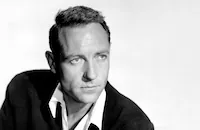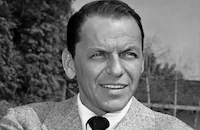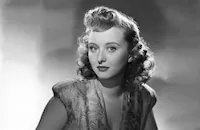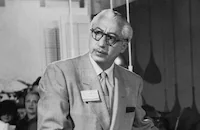The Tender Trap

Brief Synopsis
Cast & Crew
Charles Walters
Frank Sinatra
Debbie Reynolds
David Wayne
Celeste Holm
Jarma Lewis
Film Details
Technical Specs

Synopsis
New York theatrical agent Charlie Y. Reader, a confirmed bachelor and all-around cad, is paid an unexpected visit one day by Joe McCall, his boyhood friend who now lives in Indianapolis. Joe, who has decided to take a "vacation" from Ethel, his wife of eleven years, and their three children, is impressed by the attractive women constantly parading through Charlie's apartment. After Poppy Masters promises to prepare a special whitefish for Charlie, she leaves the apartment, only to be succeeded by Jessica Collins who has come to deliver a prized cheese she has bought for Charlie. As Charlie awaits the arrival of his date for that evening, concert violinist Sylvia Crewes, his neighbor Helen strolls in to take Charlie's dog for a walk. At an audition the following day, Charlie is intrigued by the talented Julie Gillis, a neophyte in the theatrical world, and invites her to join him for coffee along with Joe and Sylvia. At a café, Julie single-mindedly asserts that marriage, and not a career, is her goal in life and outlines her plan for obtaining a husband, three children and a house in Scarsdale. When Charlie invites Julie to dinner, she declines, stating that he does not fit into her "marriage plan" because there is no chemistry between them. The next day, Julie refuses to sign a contract for the run of the play, insisting that she can commit herself beyond March 12th, the day she plans to be married, even though she has not yet found a suitable candidate for the groom. Meanwhile, Joe spends his day answering Charlie's telephone, fielding messages from women trying to curry Charlie's favor. One day, when Julie has failed to appear for rehearsal, Joe and Charlie switch on the television and see her in the audience of a homemaking show, scrutinizing furniture arrangements for her future house. Charlie hurries to the television studio to see Julie, standing up Sylvia in the process. Later, at rehearsal, Charlie, unimpressed by Julie's rendition of a song, demonstrates how it should be sung. Charlie's performance makes an impression on Julie, and she accepts his invitation to dinner. While Charlie dines with Julie, Joe begins to spend time with Sylvia. One night, when Charlie discovers that Julie's parents are out of town, he takes her home early to "neck." Although Julie tries to divert him with art books, her battle is nearly lost when Charlie passionately embraces her. Encircling him with her arms, Julie feels a bulge in his coat pocket and pulls out a wad of phone messages from his many girl friends. After ordering Charlie to stop seeing other women, Julie declares she has fallen in love with him, even though he is "too selfish, arrogant and old." When she mentions marriage, he disabuses her of the notion of matrimony and she throws him out. After Charlie returns home, Helen comes to walk his dog, and when he invites her to dinner on the rebound, she informs him that she has just become engaged and will no longer be available to walk his dog. Poppy next comes to Charlie's door, and after handing him a whitefish, calls him a "stinker" and notifies him that she is now dating a "considerate man." Amused by Charlie's sudden comeuppance, Joe labels him a "louse." They then argue over Charlie's callous treatment of Sylvia. Later, when Sylvia comes to the apartment, Joe asks her why she endures Charlie's mistreatment. She replies that there are few single men available for women of her age, and concludes that although she does not love Charlie, she still wants to marry him. Charlie then emerges from the bedroom and stutters a proposal to Sylvia. She accepts, then breaks into tears, after which they all pour themselves stiff drinks. To break the air of impending disaster, Charlie decides to throw a party to celebrate his engagement and invites a number of friends to attend. After Sylvia leaves to buy food for their soon-to-arrive guests, Charlie realizes he has made a grave mistake and runs outside to hail a cab to drive him to Julie's. Just then, a cab bearing the contrite Julie pulls up outside Charlie's building. As Charlie jumps inside to embrace Julie, his guests begin to arrive, prompting Charlie to make up a story about an early rehearsal and send Julie home. The next morning, Joe awakens with an excruciating hangover and finds the apartment in disarray. Just as Julie arrives and demands an explanation for the mess, Sylvia comes in and hugs Charlie. When Julie announces that she and Charlie are engaged, Joe tells her that Charlie is engaged to Sylvia, too. After Julie storms out in indignation, Joe admits to Sylvia that he has fallen in love with her and proposes. Sylvia replies that she wants to be a wife, just like Joe's wife Ethel, and tells Joe that what he really wants is a "girl," not a wife. Sylvia then resolves to stop settling for second best and find "an honest to goodness guy." At the elevator, Sylvia meets Mr. Loughran, Charlie's handsome, eligible neighbor, who recognizes her from her television concert and invites her to dinner. As Joe packs his suitcase to return home to Ethel, an abject and lonely Charlie begins to envy Joe's life as a married man. Charlie then goes to Europe for a year to set up talent agencies, returning home just in time to attend Sylvia's wedding to Loughran. At the ceremony, Sylvia tosses Charlie her bouquet. After most of the guests depart, Charlie spots Julie, throws her the flowers and proposes.

Director

Charles Walters
Cast

Frank Sinatra

Debbie Reynolds

David Wayne

Celeste Holm
Jarma Lewis

Lola Albright

Carolyn Jones

Howard St. John
Joey Faye

Tom Helmore
William Sage
Marc Wilder
Jack Boyle
James Drury
Gordon Richards
Frank Sully
Reginald Simpson
Gil Harman
Lennie Bremen
Dave White
Wilson Wood

Benny Rubin
Herb Butterfield
Madge Blake
Phil Tead
Bette Arlen
Don Lynch
Dan Quigg
George Peters
Max Power
Virginia Murray
Mike Kostrick
Dian James
Hal Floyd
Erin Selwyn
Gus Lax
Crew
Jeff Alexander
Sammy Cahn
John Dunning
Julius Epstein
Joel Freeman
Dave Friedman
James Gathier
Cedric Gibbons
Sydney Guilaroff
Charles K. Hagedon
Kurt Hernfeld
John Logan
Arthur Lonergan
Walter March
Dr. Wesley C. Miller
Jack D. Moore
Helen Rose
William Tuttle
James Van Heusen
Paul C. Vogel
Lawrence Weingarten
Edwin B. Willis

Photo Collections
Videos
Movie Clip




Trailer
Hosted Intro
Film Details
Technical Specs

Award Nominations
Best Song
Articles
The Tender Trap
Although lightly regarded by critics today, The Tender Trap (1955) came during a crucial point in Sinatra's career. Having made a triumphant comeback a few years earlier with From Here to Eternity (1953), he continued to display his diversity as an actor by playing a drug addict in The Man With the Golden Arm (1955), for which he received an Oscar® nomination and The Tender Trap, a light comedy in the same year. The title song, "(Love is) the Tender Trap," written by Sinatra's regular collaborators Sammy Cahn and James Van Heusen, was given an Oscar® nomination for Best Song and became a signature song in Sinatra's repertoire; it hit #7 on the music charts in December of that year. During this period Sinatra's singing career also reached a breakthrough with albums such as In the Wee Small Hours and Songs for Swingin' Lovers, arranged by Nelson Riddle, in which he displayed greater emotional depth in his interpretations.
Max Shulman, who co-wrote the play, wrote a series of popular humor books in the 1950's, but is perhaps best known for creating the TV series, The Many Loves of Dobie Gillis (1959-63). Julius Epstein, along with his twin brother Philip, and Howard Koch had previously scored big with the screenplay for Casablanca (1942). Celeste Holm, best known for creating the role of Ado Annie in the original Broadway production of Oklahoma (1943), would later appear with Sinatra as the photographer Liz Imbrie in High Society (1956).
Director: Charles Walters
Producer: Lawrence Weingarten
Screenplay: Julius J. Epstein (based on a play by Max Shulman and Robert Paul Smith)
Cinematography: Paul C. Vogel
Editing: John Dunning
Music: Jeff Alexander
Cast: Frank Sinatra (Charlie Y. Reader), Debbie Reynolds (Julie Gillis), David Wayne (Joe McCall), Celeste Holm (Sylvia Crewes), Lola Albright (Poppy), Jarma Lewis (Jessica), Carolyn Jones (Helen), Howard St. John (Mr. Sayers), James Drury (Eddie).
C-112m. Close captioning. Letterboxed. Descriptive Video.
by James Steffen

The Tender Trap
Quotes
Joe, do you have any idea what's available to a woman of 33? Married men. Drunks. Pretty boys looking for someone to support them. Lunatics looking for their fifth divorce! It's quite a list, isn't it?- Sylvia Crewes
Go ahead, punch me in the nose!...- Joe McCall
Why should I? You'd punch back!- Charlie Reader
Trivia
Notes
The film opens with an extreme long shot of Frank Sinatra singing the title song. He then walks toward the camera, and when his image comes into medium-shot range, the camera begins to track with him. As he sings the words "tender trap," the film's title appears on the screen. The film ends in a similiar fashion, as its four stars sing the title song. Although a January 1955 Hollywood Reporter news item notes that Robert Paul Smith, the co-author of the play, was hired to write the film's screenplay, the extent of Smith's contribution to the final screenplay has not been determined. A June 1955 Hollywood Reporter news item lists Casey Adams in the cast, but his appearance in the released film has not been confirmed. May 1955 Hollywood Reporter news items state that Mitzi Gaynor and Barbara Darrow were considered for roles in the film. The title song " (Love Is) The Tender Trap" was nominated for an Academy Award for Best Song, and became a hit record for Sinatra.

Miscellaneous Notes
Released in United States 1998
Released in United States Winter December 1955
CinemaScope
Released in United States 1998 (Shown in New York City (Walter Reade) as part of program "A Salute to Sinatra" August 21 - September 8, 1998.)
Released in United States Winter December 1955

















